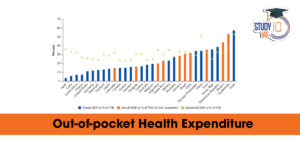Table of Contents
Context: The IMF’s Fiscal Monitor and Financial Stability Report (FSR) has raised serious concerns about the global economic outlook, especially in the context of rising public debt, volatile financial markets, and policy uncertainties, including those associated with the US trade policies.
Key Highlights of IMF’s Fiscal Monitor and Financial Stability Report (FSR)
Rising Global Debt
- The IMF projects public debt to rise by 4% of GDP in advanced economies and 6% in emerging economies in the medium term.
- India’s central government debt is expected to reach ₹196.7 lakh crore by FY26, with a debt-to-GDP ratio of 56.1%, far from the Fiscal Responsibility and Budget Management (FRBM) target of 40%.
Challenges to Fiscal Consolidation
- Geo-economic turbulence may increase public spending while reducing revenues, thus expanding fiscal deficits.
- Despite recent fiscal prudence, India must stay cautious given the slow pace of debt reduction.
Debt Servicing Concerns
While fresh borrowing costs (G-sec yields) have declined slightly, the interest burden on existing debt remains unchanged (coupon rate ~7.3%).
FSR Concerns for India’s Financial System
- Asset Overvaluation: Equity and corporate bond markets still appear overvalued, suggesting scope for further market correction.
- Interest Rate Risks: If EMs like India cut interest rates, the rate differential with the US narrows, increasing risks of capital outflows.
- Systemic Financial Risks: High leverage of hedge funds and asset managers may destabilize financial systems if bank exposure increases.
- Crypto Asset Risks: IMF calls for clear tax policies on crypto and warns of systemic contagion, advocating multilateral regulation and global financial safety nets.
Way Forward for India
- Prudent fiscal management at both the Centre and State levels.
- Tax reforms to enhance revenue buoyancy.
- Debt management strategies to reduce long-term interest burden.
- Strengthening regulatory oversight over financial markets and crypto assets.
- Active participation in global financial coordination mechanisms.


 SEBI’s SWAGAT-FI Framework for Low-Ris...
SEBI’s SWAGAT-FI Framework for Low-Ris...
 Out-of-Pocket Health Expenditure, Reason...
Out-of-Pocket Health Expenditure, Reason...
 Treasury Bills (T-bills): RBI Cuts Holdi...
Treasury Bills (T-bills): RBI Cuts Holdi...




















